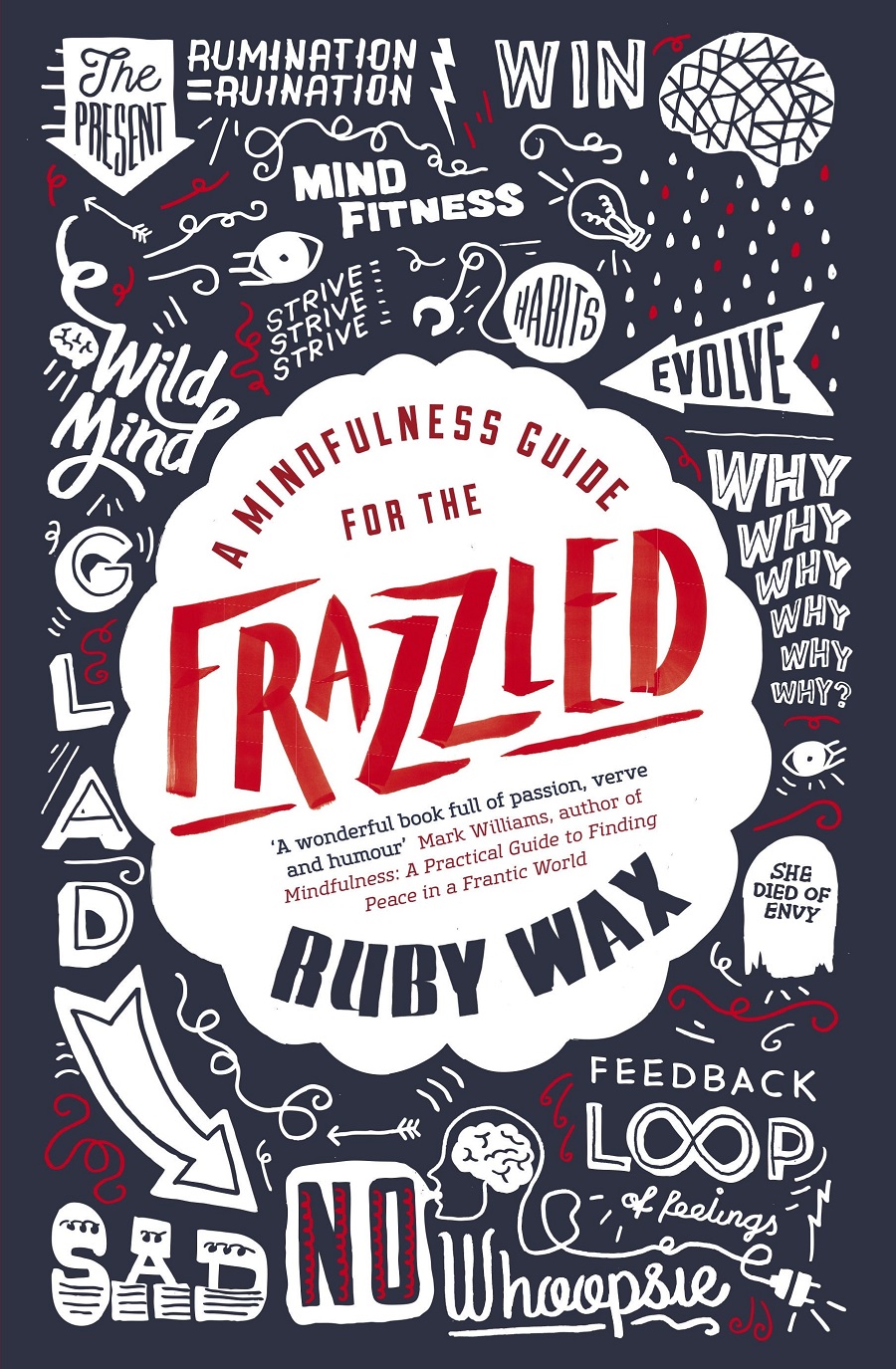THEY are everywhere, from adult colouring-in books to books on monks who sell their Ferraris. They bleat stridently about how we need to be mindful to navigate modern life without going nuts, unwittingly adding to the multitude of calls on our conscience. That which purports to make us calmer inadvertently makes us more anxious than ever.
They are the books on "mindfulness", that new fad that calls on us to live "in the moment", despite the 101 things on our always added-to to-do lists.
Many are sanctimonious treatises. This one isn’t. Every page of US comedian Ruby Wax’s mindfulness book is chock full of raw honesty and her ironic humour. It’s refreshing. It’s entertaining. It’s affecting.
Wax is no self-professed guru offering the path to nirvana; she is a fellow sufferer telling how she clawed her way out of mental illness using a mindfulness practice.
"On your computer, tune into what the sensations are of tapping your fingers on the keys. Come off autopilot and notice when your mind begs you to type and, when you do, come back to the feeling in your fingertips," she says at the start of her six-week do-it-yourself course in mindfulness. It can’t be that hard — can it — to do that? It doesn’t involve sitting with your legs in an uncomfortable position trying to think of nothing.
Sure, the practice of mindfulness suffers, in our science-oriented world, from sounding too touchy-feely, but — as Wax shows — there is hard science to prove its efficacy.
Wax knows. Bitten by the black dog of depression (again), she took herself off to Oxford University to read a Masters in mindfulness-based cognitive therapy. (She already had a degree in psychology from the University of California, Berkeley). She is a visiting professor in mental health nursing at the University of Surrey.
There’s a chapter dedicated to the science that backs up the touchy-feely stuff. It’s even fun to read — Wax has a delightfully sarcastic turn of phrase. That’s good, because, unless you have been under a rock somewhere, or absolutely never bored waiting for a dentist, you have probably read many versions of why mindfulness is good for you.
How come, asks Wax, when any of your other organs get sick, you get sympathy, but when your mind goes awry you are told to snap out of it? It’s a good question.
"My definition of mindfulness is noticing your thoughts and feelings without kicking your own ass while doing it," she writes.
I have not read even a smidgeon of the mindfulness books out there, but if that is what you are seeking, this is a good buy.

Ruby Wax. Picture: SUPPLIED
THEY are everywhere, from adult colouring-in books to books on monks who sell their Ferraris. They bleat stridently about how we need to be mindful to navigate modern life without going nuts, unwittingly adding to the multitude of calls on our conscience. That which purports to make us calmer inadvertently makes us more anxious than ever.
They are the books on "mindfulness", that new fad that calls on us to live "in the moment", despite the 101 things on our always added-to to-do lists.
Many are sanctimonious treatises. This one isn’t. Every page of US comedian Ruby Wax’s mindfulness book is chock full of raw honesty and her ironic humour. It’s refreshing. It’s entertaining. It’s affecting.
Wax is no self-professed guru offering the path to nirvana; she is a fellow sufferer telling how she clawed her way out of mental illness using a mindfulness practice.
"On your computer, tune into what the sensations are of tapping your fingers on the keys. Come off autopilot and notice when your mind begs you to type and, when you do, come back to the feeling in your fingertips," she says at the start of her six-week do-it-yourself course in mindfulness. It can’t be that hard — can it — to do that? It doesn’t involve sitting with your legs in an uncomfortable position trying to think of nothing.
Sure, the practice of mindfulness suffers, in our science-oriented world, from sounding too touchy-feely, but — as Wax shows — there is hard science to prove its efficacy.
Wax knows. Bitten by the black dog of depression (again), she took herself off to Oxford University to read a Masters in mindfulness-based cognitive therapy. (She already had a degree in psychology from the University of California, Berkeley). She is a visiting professor in mental health nursing at the University of Surrey.
There’s a chapter dedicated to the science that backs up the touchy-feely stuff. It’s even fun to read — Wax has a delightfully sarcastic turn of phrase. That’s good, because, unless you have been under a rock somewhere, or absolutely never bored waiting for a dentist, you have probably read many versions of why mindfulness is good for you.
How come, asks Wax, when any of your other organs get sick, you get sympathy, but when your mind goes awry you are told to snap out of it? It’s a good question.
"My definition of mindfulness is noticing your thoughts and feelings without kicking your own ass while doing it," she writes.
I have not read even a smidgeon of the mindfulness books out there, but if that is what you are seeking, this is a good buy.






















Change: -0.47%
Change: -0.57%
Change: -1.76%
Change: -0.34%
Change: 0.02%
Data supplied by Profile Data
Change: -1.49%
Change: 0.08%
Change: -0.47%
Change: 0.00%
Change: -0.04%
Data supplied by Profile Data
Change: -0.34%
Change: 0.03%
Change: -0.10%
Change: -0.22%
Change: -0.69%
Data supplied by Profile Data
Change: -0.28%
Change: -1.15%
Change: -0.07%
Change: -1.21%
Change: -0.22%
Data supplied by Profile Data